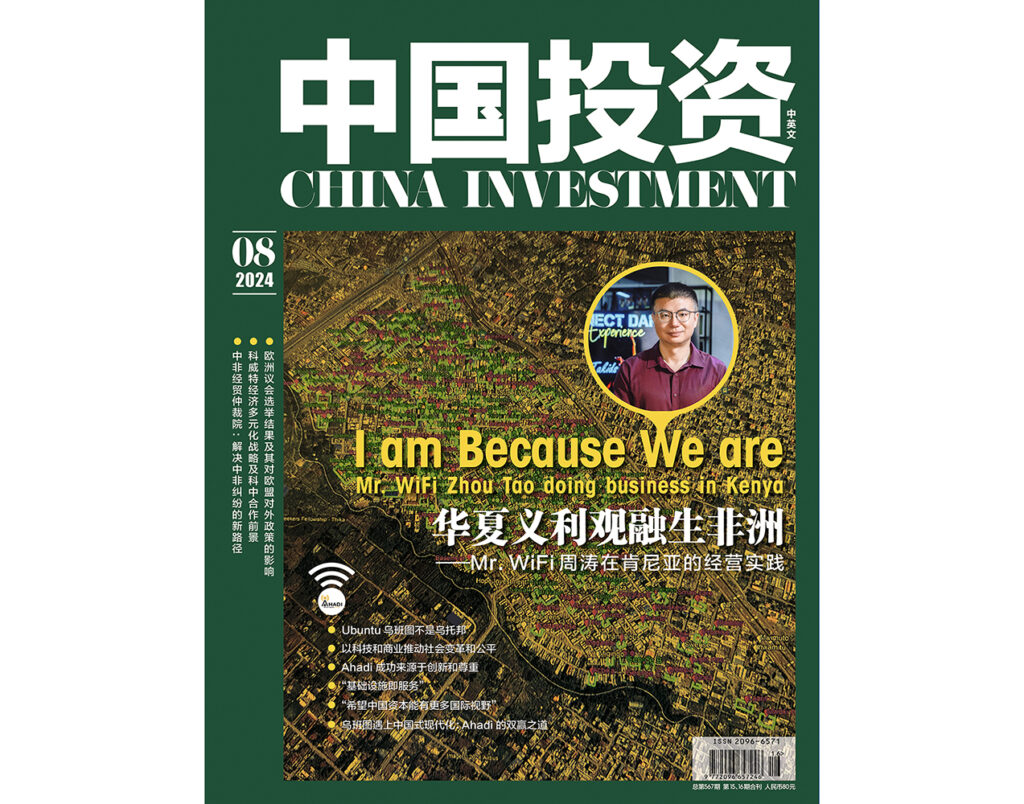
8月号封面文章
华夏义利观融生非洲
● 以科技和商业推动社会变革和公平——专访非洲诺联科技公司创始人兼首席执行官周涛
● Ahadi 成功来源于创新和尊重——专访非洲诺联科技公司联合创始人大卫·卡比鲁(David Kabiru)
● “基础设施即服务”——专访非洲诺联科技公司合伙人李奕
● “希望中国资本能有更多国际视野”——专访非洲诺联科技公司合伙人沈晨岗
● 乌班图遇上中国式现代化:Ahadi 的双赢之道
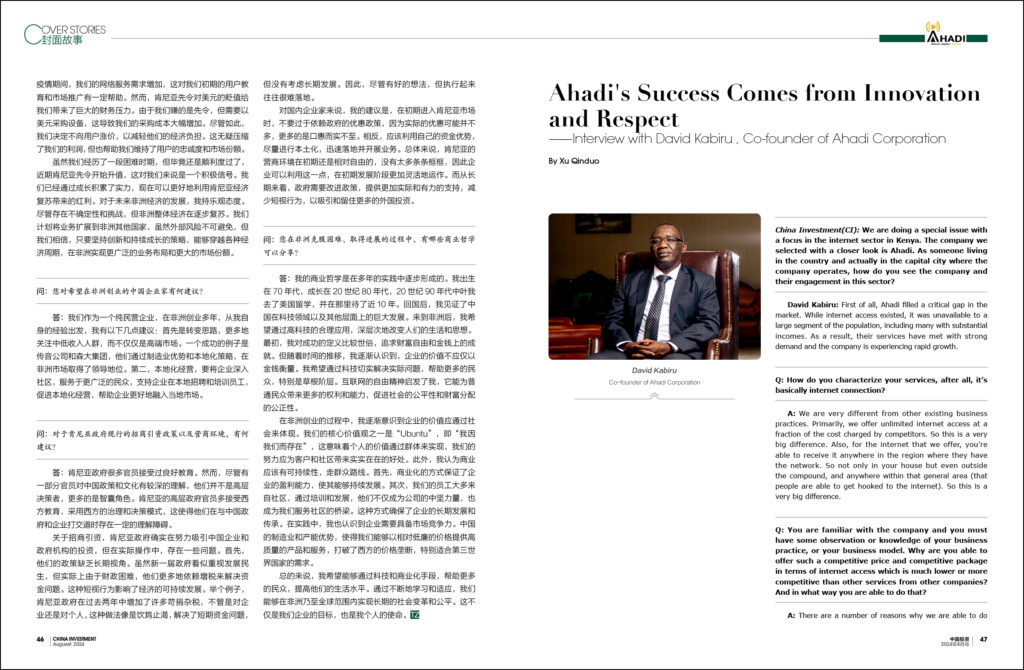
By Xu Qinduo
文|许钦铎 特邀记者 图片提供|非洲诺联科技公司
导读
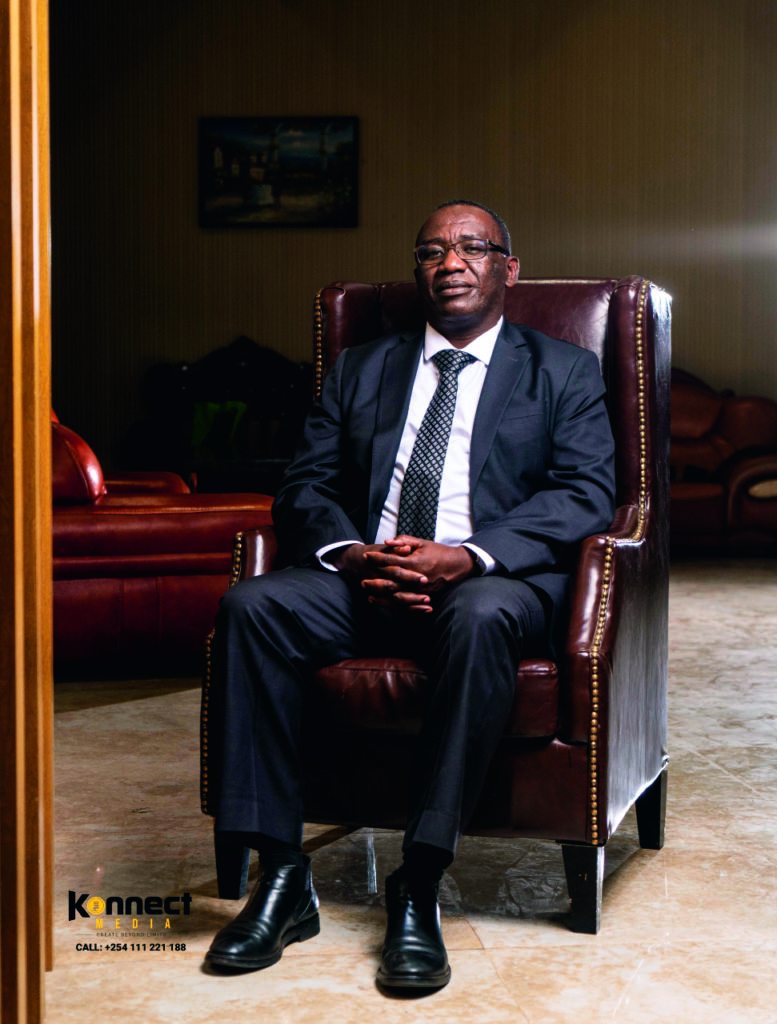
⬆ David Kabiru, Co-founder of Ahadi Corporation
China Investment(CI): We are doing a special issue with a focus in the internet sector in Kenya. The company we selected with a closer look is Ahadi. As someone living in the country and actually in the capital city where the company operates, how do you see the company and their engagement in this sector?
David Kabiru: First of all, Ahadi filled a critical gap in the market. While internet access existed, it was unavailable to a large segment of the population, including many with substantial incomes. As a result, their services have met with strong demand and the company is experiencing rapid growth.
Q: How do you characterize your services, after all, it’s basically internet connection?
A: We are very different from other existing business practices. Primarily, we offer unlimited internet access at a fraction of the cost charged by competitors. So this is a very big difference. Also, for the internet that we offer, you’re able to receive it anywhere in the region where they have the network. So not only in your house but even outside the compound, and anywhere within that general area (that people are able to get hooked to the internet). So this is a very big difference.
Q: You are familiar with the company and you must have some observation or knowledge of your business practice, or your business model. Why are you able to offer such a competitive price and competitive package in terms of internet access which is much lower or more competitive than other services from other companies? And in what way you are able to do that?
A: There are a number of reasons why we are able to do this. And all of them largely stand for innovations that the company has been able to come up with. Within the sector, one of the reasons is that our internet is a shared service – the cost is shared by a number of individuals, therefore bringing down the individual cost.
The other reason is that we have been able to integrate our activities to be able to source internet from the providers who do the ocean traffic. Therefore we’re able to get a cheaper cost. we’ve also put up our own fiber from the data center to the customers, therefore eliminating other players who’d come in between, which leads to a high cost. The other innovation is that what we have done is not to have a lot of overhead costs. Our office is where the community is and we also recruit our staff from the community. So you find we do not have big headquarters – flashy and expensive, therefore limiting our costs. We also invested a lot in IT solutions. So that a lot of our work is done digitally. Therefore we are able to track in to make sure that we are not only efficient but also are quite effective.
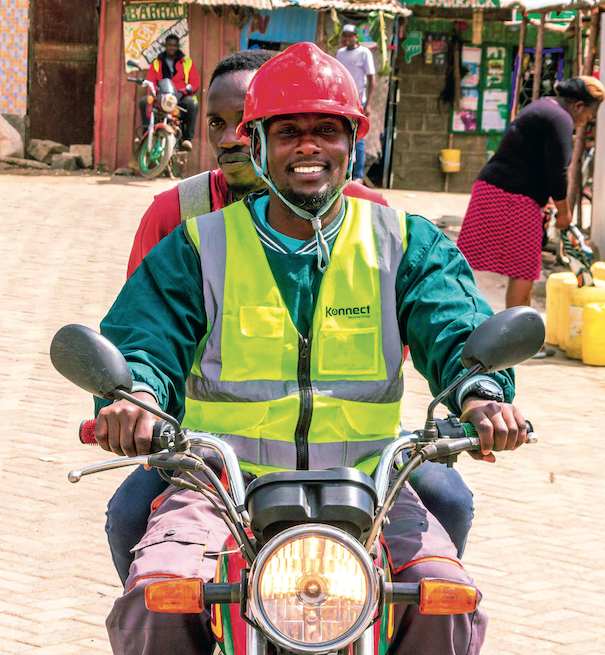
⬆ Konnect maintenance engineers on their way to a customer site to address technical issues
Q: Beyond the internet services you have expanded your businesses into clean water service you know in commerce and also digital payment. And how about those services you know? How are they received by the local consumers?
A: These services have been well-received by the community. To put it in perspective, the company is providing essential services that meet critical local needs. Like clean water distribution. It’s a service greatly needed as clean water is every expensive. So we were able to reduce the cost significantly by introducing vending machines within the community tied with the internet provided. So that all you have to do is to scan a QR code and you get your water. The e-commerce was also a response during Covid time. A lot of people would not be able to source goods because of the restrictions on movement. Therefore, the e-commerce came in very handy, also meeting a great need in the community.
Again, these services are limited where the company provides internet, where they are able to solve a big challenge of e-commerce, which was the issue of addresses, because, in Africa, addresses are a bit complicated. On the one for digital payment again, it has an effort to reduce the cost of doing e-commerce and paying for services. In Kenya, we have a less robust digital payment environment. But also it is expensive. So we introduced a digital payment service which we didn’t charge any fees for it. So all have been received very well.
Q: Investment in those sectors like clean water, digital payment, what do they mean to Kenya and the local community?
A: In the communities where the company has already set up this development, this has really changed how they interact. One example is that each Kenyan consumes 1.5 G of data on average. Whereas the company has a network people are already consuming over 50 GB of data. Online services have become more affordable for the community, revolutionizing access to entertainment and education. This increased availability has significantly improved quality of life for residents in areas where these services are now offered.
Q: That’s really something. The cheaper access to the internet – as what’s happened in other developing countries like China empowers people to do a lot of things of their choice, such as education, access to information, medical services, etc.
A: Exactly. It’s offering a large portion of people things that are just taken for granted in the developed world. Access to the internet isn’t a luxury anymore – it’s become a basic human need. So being able to bring this to people in lower and middle class has been extraordinary.
Q: The founder of Ahadi Mr. Zhou is said to have got the idea of investing in Africa, at least partly, from you. You guys talked to each other frequently when you were in Beijing a few years back. Tell us more on what you told him about investing in Africa?
A: I think he’s been very kind to me when he said he got the idea from me. I think he already had the idea somehow. But what happened is Mr. Zhou was doing his business in China already. And so when we discussed how it could be done in Africa, I then pointed out that the challenge will be the access to the internet because you cannot have better computing without internet access. That was how we started this discussion. Why is internet in China affordable, but internet productivity in Africa is not? And we started looking at what are the reasons for that. I was lucky enough because he also exposed to me and took me around different cities and different places in China just to be able to appreciate how China has been able to make internet available to its people and that’s how this idea came about.
I have to say the year we started with when it was still unaffordable internet. How to provide it, the company had to innovate. Over the past four years, we tried many solutions. It wasn’t until a major technical upgrade was successfully implemented last year that our network became very stable.
Q: How the business people have been able to use the service as internet access gets cheaper and easier?
A: If you can imagine a lot of the small businesses are now able to advertise online and people able to start opening up shops online. So while this is still something that is progressing, we are hoping to see an expansion of this may be in the lines of the Taobao or the other apps or other programs that are able to help people to get the businesses online. but we have seen a big update. People tell us now they are able to advertise you know put up our websites where they can case their products and this has led to an increase itself for this business possible.
Q: Ahadi is a successful investment case, but they also faced many challenges in the early stages of their startup. As an expert familiar with the business environment in Kenya and Africa, what do you think investors need to know before investing?
A: Mr. Zhou was a bit different because he had visited Africa before. But one of the first things I tell Chinese investors is that you need to visit the country you want to invest it before you decide on investment, this is because African countries are very different and the environments are very different. Secondly, the culture, the people in the country are different. So that was a challenge. You have to respect and find a way to marry the Chinese culture and the Kenya culture. In the case of Mr. Zhou, he was able to manage this very well. Where it is more systems to the business runner inwards where you find the even the top government officials look forward to learning more and more about China and how to do something that is a very very important for investors.
The other is that you have to understand the regulatory process, you take time to find an advisor who can tell you what licenses you need, and what you need to take into account so that you are on the right side of authorities. Overall, Africa is open to business, Kenya is open to business. Some barriers have been removed, although there’re still challenges. If you go to the Kenyan investment authorities with your investment idea, they’ll be able assist you to be able to navigate the challenges.
Q: Back to Ahadi, what do you attribute their success to?
A: Well, the first thing is innovation, seeing challenges as opportunities for new products or services. The second one I would say is the work ethic. I don’t know if this is the Chinese work culture, but how he faces his challenges is really unique and in most cases challenges that would make other companies fall, he would be able to turn them into great opportunities for the company. The third one is a supply chain. We are able to source products from China, from manufacturers. Because Mr. Zhou has knowledge of the supply side. We are able to cut costs. These initial successes are also attributed to the Kenyan market’s demand for innovation. People are already exposed to the Internet so they can easily find new services Ahadi provides. Mobile payments have also been a key factor in this success, as people can access the internet with little money, with the pay-as-you-go model.
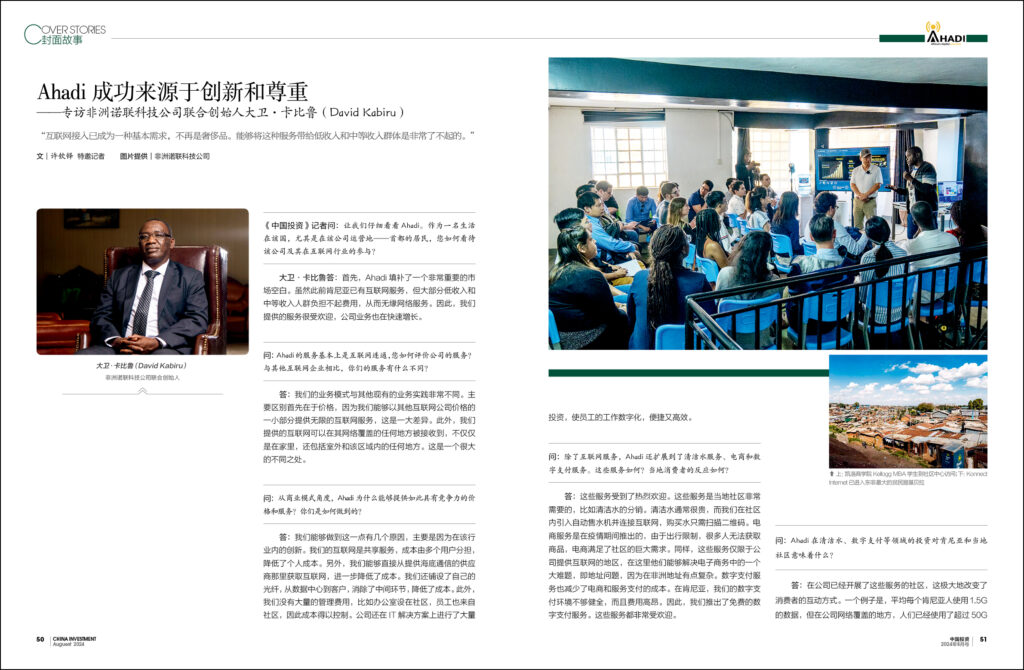

⬆ 大卫·卡比鲁(David Kabiru),非洲诺联科技公司联合创始人
《中国投资》记者问:让我们仔细看看Ahadi。作为一名生活在该国,尤其是在该公司运营地——首都的居民,您如何看待该公司及其在互联网行业的参与?
大卫·卡比鲁答:首先,Ahadi填补了一个非常重要的市场空白。虽然此前肯尼亚已有互联网服务,但大部分低收入和中等收入人群负担不起费用,从而无缘网络服务。因此,我们提供的服务很受欢迎,公司业务也在快速增长。
问:Ahadi的服务基本上是互联网连通,您如何评价公司的服务?与其他互联网企业相比,你们的服务有什么不同?
答:我们的业务模式与其他现有的业务实践非常不同。主要区别首先在于价格,因为我们能够以其他互联网公司价格的一小部分提供无限的互联网服务,这是一大差异。此外,我们提供的互联网可以在其网络覆盖的任何地方被接收到,不仅仅是在家里,还包括室外和该区域内的任何地方。这是一个很大的不同之处。

⬆ 凯洛商学院Kellogg MBA学生到社区中心访问
问:从商业模式角度,Ahadi为什么能够提供如此具有竞争力的价格和服务?你们是如何做到的?
答:我们能够做到这一点有几个原因,主要是因为在该行业内的创新。我们的互联网是共享服务,成本由多个用户分担,降低了个人成本。另外,我们能够直接从提供海底通信的供应商那里获取互联网,进一步降低了成本。我们还铺设了自己的光纤,从数据中心到客户,消除了中间环节,降低了成本。此外,我们没有大量的管理费用,比如办公室设在社区,员工也来自社区,因此成本得以控制。公司还在IT解决方案上进行了大量投资,使员工的工作数字化,便捷又高效。
问:除了互联网服务,Ahadi还扩展到了清洁水服务、电商和数字支付服务。这些服务如何?当地消费者的反应如何?
答:这些服务受到了热烈欢迎。这些服务是当地社区非常需要的,比如清洁水的分销。清洁水通常很贵,而我们在社区内引入自动售水机并连接互联网,购买水只需扫描二维码。电商服务是在疫情期间推出的,由于出行限制,很多人无法获取商品,电商满足了社区的巨大需求。同样,这些服务仅限于公司提供互联网的地区,在这里他们能够解决电子商务中的一个大难题,即地址问题,因为在非洲地址有点复杂。数字支付服务也减少了电商和服务支付的成本。在肯尼亚,我们的数字支付环境不够健全,而且费用高昂。因此,我们推出了免费的数字支付服务。这些服务都非常受欢迎。
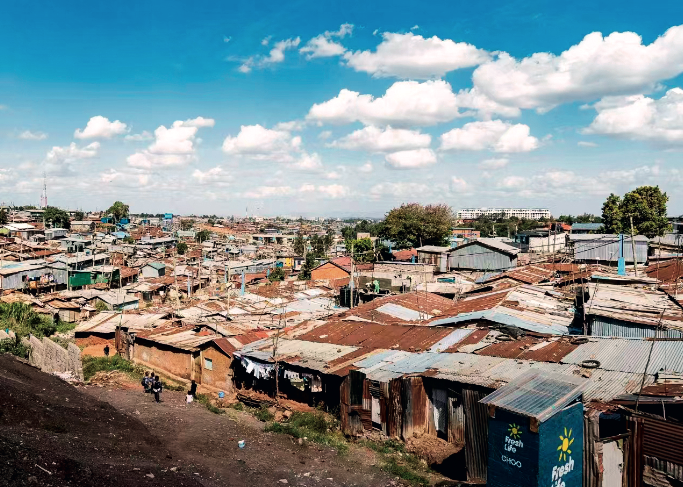
⬆ Konnect Internet已进入东非最大的贫民窟基贝拉
问:Ahadi在清洁水、数字支付等领域的投资对肯尼亚和当地社区意味着什么?
答:在公司已经开展了这些服务的社区,这极大地改变了消费者的互动方式。一个例子是,平均每个肯尼亚人使用1.5G的数据,但在公司网络覆盖的地方,人们已经使用了超过50G的数据。因此,消费者能够负担得起许多在线服务,娱乐、教育等领域也因此发生了很大的变化。
问:更便宜的互联网接入赋予人们很多选择,如教育、信息获取、医疗服务等,不是吗?
答:确实如此,这为大量人口提供了发达国家视为理所当然的东西。互联网接入已成为一种基本需求,不再是奢侈品。能够将这种服务带给低收入和中等收入群体是非常了不起的。
问:Ahadi的创始人周先生说,他在一定程度上是从您那里得到了投资非洲的想法。请告诉我们您当时对他的建议?
答:谢谢周先生这么说。他说他从我这里得到了这个想法,这个太抬举我了。我认为他那个时候已经有了到非洲来投资的想法。我们讨论的是虚拟计算(virtual computing)在非洲的可能性,而当时我指出了互联网接入是一个挑战,因为没有互联网就没有虚拟计算环境。我们开始讨论研究这个问题:为什么中国的互联网人们负担得起,而非洲的互联网连接服务却很贵?周先生带我参观了中国的不同城市和不同地方,让我了解中国是如何普及互联网的,这就是这个想法的起源。值得一提的是,在我们启动的时候,这里依然没有人们负担得起的网络。如何提供它,公司必须创新。过去四年中我们尝试了许多方法,直到去年一次重大技术方案升级成功落地后,我们的网络才变得非常稳定。

⬆ 2022年公司年会销售团队合影
问:随着互联网接入变得更便宜和更容易,商业人士如何利用这一服务?
答:许多小企业现在能够发布在线广告,并开始开设在线商店。虽然这还在进展中,但我们希望看到这种趋势可以继续扩展,比如发展出类似于淘宝的应用程序。我们已经看到很多企业在网上展示他们的产品,销售额也开始有所增加。
问:Ahadi是一个成功的投资案例,但初期也遇到了许多挑战。作为一名了解肯尼亚和非洲商业环境的专家,您认为投资者在投资前需要了解什么?
答:周先生有所不同,因为他之前就访问过非洲。我对中国投资者的第一个建议是,在决定投资前需要访问你想投资的国家,因为非洲国家的环境非常不同。其次是文化和人的差异,你需要找到一种方法将中国文化和肯尼亚文化结合起来。周先生在这方面处理得非常好,让文化不同成为业务发展的促进因素而不是障碍。在商界,你会发现即使是顶尖人物也渴望学习更多关于中国的知识,以及如何做某事,这对投资者来说非常重要。此外,你需要了解监管流程,聘请商业顾问告诉你开展业务需要哪些证件等。总体来说,非洲和肯尼亚对外国投资者保持开放,欢迎投资。如果遇到问题,也可以通过官方的肯尼亚投资局寻求帮助。
问:再回到Ahadi公司,您认为你们在肯尼亚市场成功的原因是什么?
答:首先是创新,我们能够应对挑战,将挑战转化为新的产品或服务。其次是我们的职业道德和产品。我不知道这是否是中国的职场文化,周先生应对挑战的方式十分独特,有些挑战可能让许多公司止步不前,但是他却能够将危机和挑战成功转为机会。第三是整合供应链,我们能够从中国采购产品,周先生对供应方很了解,能够降低成本。这些初步的成功还得益于肯尼亚市场对创新的需求。人们已经接触到了互联网,因此可以轻松找到 Ahadi 提供的新服务。移动支付也是成功的关键因素之一,因为人们可以通过按需付费的模式,以较少的资金上网。

